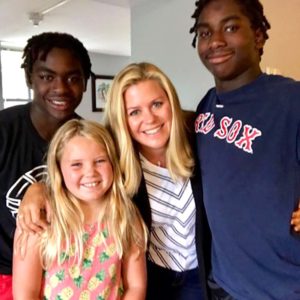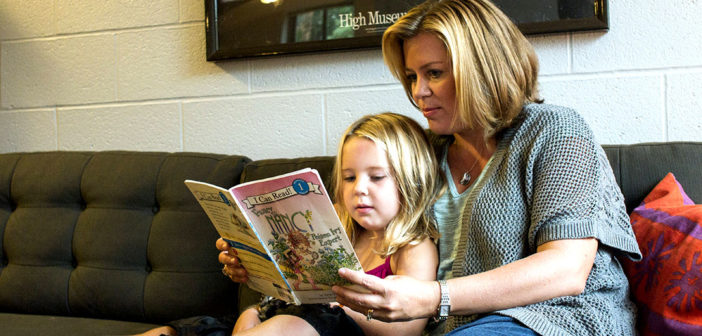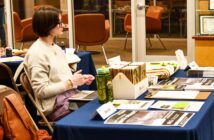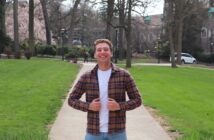
The Johnson family, from left, Kyle, Meera, Heather Johnson, associate professor of sociology, and Owen. Johnson lives with her family in Sayre Park Village Building B. (Courtesy of Lehigh University)
Heather Johnson, an associate professor of sociology, is currently the only Lehigh professor living on campus, despite the coronavirus pandemic. As a Faculty Residential Fellow, Johnson lives with her three children in Sayre Park Village Building B.
Since Lehigh has been closed indefinitely and classes have gone remote, Johnson and her family have experienced noticeable differences while living at Sayre.
After living in Sayre for eight years now, Johnson said the complete shutdown of Lehigh has been significantly different than anything her family has experienced before, including Hurricane Sandy, when the campus was evacuated.
“It’s so weird, even in the summer when there are less students here, it isn’t as vacant as it is now,” said Kyle Johnson, Heather’s 15-year-old son. “It is completely different and unusual now.”
Heather Johnson said the entire purpose of the Faculty in Residence program is for faculty and their families to break down the divide between students and professors and to get to know each other on a different level than in the classroom.
“The whole reason we live at Sayre is to interact with students, and to live and to learn in a community with students and to participate in the campus and the life on the campus,” Heather Johnson said. “Everyday my kids interact with students because we literally live with them.”
As a single mom with three kids, this time has been intense, Johnson said.
Heather’s son Owen, a freshman in high school, said as a whole, the campus is quiet, with few cars on the roads.
“It’s really vacant,” Owen Johnson said. “I can ride my bike anywhere.”
All members of the family, even non-human ones, have been affected by the campus closure.
“While my kids and I are handling this really beautifully I think, our dog, Dash, on the other hand, is a total wreck,” Heather Johnson said.
Dash was used to having students pet him, greet him or go on walks with him — and now it’s as if his whole purpose in life is gone, Heather Johnson said.
“He is so depressed, it’s so sad and concerning,” Heather Johnson said. “It really just shows how connected he was to the students, too.”
As a sociology professor, Johnson said she has several concerns regarding remote teaching, especially with the goals she had initially set forth for her class, which foster group discussion and collaboration among peers.
She said the connectivity she tried to foster in her courses in the first half of the semester was intended to lead to greater success in group projects in the second half.
As a discussion-oriented teacher, she teaches her sociology class in the Sayre lodge, a community building in Sayre, to connect teaching with living, Heather said.
“I had really invested bonding in the first semester of my sociology class and saw that my students were really connecting, and that I was connected with them,” Heather Johnson said. “Then, everything abruptly happened, and it has fundamentally been really drastic for my teaching.”
Her students, similarly, have emailed her expressing their concerns about losing their sense of community in Sayre, but also in class.
Not only do her concerns stem from remote learning, but she said she also has concerns about students who are in tough situations at home and students who do not have reliable internet access.
Johnson’s main focus right now, she said, is trying to maintain a community with her students.
“Living and learning communities is the idea of community,” she said. “So, my biggest advice would be to try to maintain community, to try to be connected, to try to look out for each other and to also try to reach out when you need help.”






Comment policy
Comments posted to The Brown and White website are reviewed by a moderator before being approved. Incendiary speech or harassing language, including comments targeted at individuals, may be deemed unacceptable and not published. Spam and other soliciting will also be declined.
The Brown and White also reserves the right to not publish entirely anonymous comments.